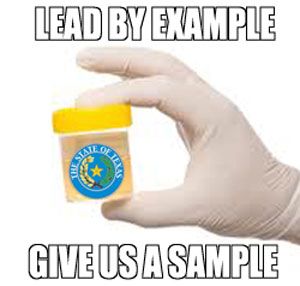It’s back, and it’s as bad an idea as it ever was.
For years, GOP lawmakers have tried to make drug testing mandatory for some Texans who receive state welfare benefits, with little success.
But after making some headway in the Texas Senate in the 2013 legislative session, they hope to pick up where they left off — pushing bills they say keep taxpayer dollars from supporting people who abuse drugs.
Two bills filed by state Sen. Jane Nelson, R-Flower Mound, and state Rep. Ken King, R-Canadian, would subject people seeking cash assistance from the state’s welfare program — Temporary Assistance for Needy Families — to drug tests if their responses to a screening questionnaire suggested drug use.
The measures are sure to face opposition from some Democrats, backed by advocacy groups who say such drug testing might be unconstitutional.
[…]
Nelson said she’s confident the welfare drug-testing bill will pass this time around given the unanimous vote it received in the Senate and the “great deal of support” it picked up in the House.
“Taxpayer dollars should not be used to support a person’s drug habit,” Nelson said in a statement. “We need to ensure this program is putting individuals on a true path to self-sufficiency, and drugs are a barrier to independence.”
But opponents of the bill argue that there’s little evidence to prove that recipients of welfare use their cash assistance to purchase drugs, and that drug testing will do little to help families already in need. If a parent tests positive for drugs, the state would be required to report that individual to the Texas Department of Family and Protective Services.
“Our concerns are that the legislation doesn’t so much address the issue as punish families that are already going through a crisis of their own,” said Will Francis, director of government relations for the Texas chapter of the National Association of Social Workers.
See here for some background; the bills in question are SB54 and HB352. I’ll believe this is something other than an expression of official contempt for poor folks when someone proposes drug testing for the recipients of various incentive programs and the beneficiaries of the business tax cuts Greg Abbott is insisting on. I mean, fair is fair, and they’ll be getting a lot more dough than the TANF recipients will. Only-half-joking snark aside, drug testing for welfare recipients has no real policy justification for it. Harold Pollack explains.
What’s particularly strange about the drug-testing campaign is that if you’re trying to find people with substance-use disorders, your local sports bar, community college, or hospital ER would provide a more target-rich environment. Given the high rates of injury among intoxicated young adults, such efforts would arguably be a wiser use of public funds. Other measures such as increased alcohol taxes would also be valuable.
The drug testing of SNAP recipients is yet another ideological sideshow that disfigures substance-abuse policy. It falsely implies that substance use disorders are a widespread cause of welfare dependence. It also implies, again falsely, that these disorders are highly concentrated among recipients of public aid.
Using 2011 data from the National Survey of Drug Use and Health (NSDUH), we looked at the behaviors and circumstances of adults ages 18-64 whose households received SNAP.[i]. We examined whether respondents had used some illicit substance during the previous month or year. We then looked at whether they met screening criteria for abuse or dependence on alcohol or illicit drugs. These are the people who would be referred for treatment by mandatory drug testing.
The basic pattern is shown in Figure 1, which compares SNAP recipients ages 18-64 (the blue bars) with non-recipients (red bars) on various measures of substance use and actual use disorders. The green bars then show the additional risk associated with SNAP receipt, adjusting for gender, age, education, race/ethnicity, marital status, and the number of minor children in the home.[ii] Because SNAP recipients are poorer, less-educated, and younger than non-recipients, the adjusted risk associated with SNAP receipt is noticeably smaller than the unadjusted differences on virtually every measure.
Sure enough, SNAP recipients are somewhat more likely than others to use or misuse illicit substances. About 24 percent of SNAP recipients and 16 percent of those who don’t get SNAP have used at least one illicit substance in the past year. This drops to 13.1 percent for SNAP recipients and 7.5 percent for non-recipients if one excludes marijuana.
Note, however, that the actual prevalence of illicit substance use disorders remains quite low—only about 5.3 percent among SNAP recipients who are only about 1.7 percentage-points more likely to have such disorders than comparable non-recipients.
And if one excludes marijuana, then abuse or dependence of other illicit substances is rare within the SNAP population. By far the most common substance use disorders among SNAP recipients (and among the general population) arise from alcohol use—behaviors generally left undetected by drug-testing.
On every measure we examine, SNAP recipients are only slightly more likely than non-recipients to display substance use disorders. Yet the absolute risks associated with SNAP receipt are quite small. And some obvious socio-demographic subgroups display much higher prevalence of substance use disorders than SNAP recipients do.
I strongly suspect the reason for these bills, beyond the contempt being expressed, is the belief/hope that some number of folks who would qualify for this benefit will not bother to apply out of fear or shame, and that this will save a few bucks. I bet we’d save even more under my drug testing proposal.

